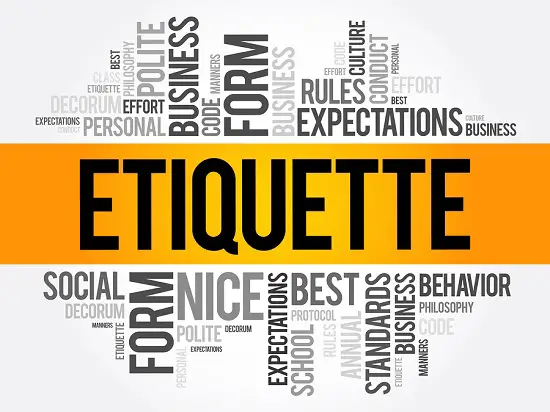| “Etiquette” is a French word. The original meaning was “little tickets”. |
| These tickets were given to people who were attending a public ceremony. |
| Printed on the ticket were instructions about how to behave on this occasion. |
| So etiquette came to mean the way to behave on public occasions. |
| Etiquette today includes how to introduce people; |
| how to eat properly; how to dress for different occasions; |
| how to speak to different people; and what to do on special occasions. |
| Almost every part of social life can have its particular etiquette. |
| Sometimes, etiquette changes or seems to change. |
| There was much behavior attached to courtship, such as a man holding the door open for a woman. |
| Nowadays, some people find this outdated. |
| But politeness is always a good idea. |
| It is nice to hold the door open for the next person, whoever they are. |
| In fact, it sometimes seems like contemporary life encourages bad manners. |
| Etiquette is no longer taught to young people. |
| Moreover, in a youth culture, young people take their examples from other young people. |
| As a result, good manners aren’t considered important. |
| The point of etiquette is to help people to get along with each other. |
| If people behave in an accepted manner, |
| there is less chance of misunderstanding. |
| It is important for people to think about treating other people well. |
| If everyone does what they feel like doing, it doesn’t seem like they respect other people. |
| Etiquette can help things to go a lot smoother. |
| Manners vary from culture to culture, but the intention is the same: |
| to treat people with consideration. |
| This is a way to reduce conflict. |
| Sometimes, we can understand where these customs come from. |
| Originally, shaking hands with your right hand probably meant that you weren’t carrying a weapon. |
| Taking off your hat may originally have been taking off your helmet. |
| This meant that you weren’t going to fight. |
| Nowadays, there are new areas of social life. |
| For example, a lot of conversation now takes place on the telephone. |
| Perhaps because there is no traditional telephone etiquette, some people feel free to be rude. |
| Try to treat the person on the phone just the way you would treat them if you were actually talking to them. |
| Most people feel it is rude to interrupt a conversation. |
| But many people seem to think that it is okay to interrupt someone talking on the phone. |
| Children especially need to be taught not to interrupt. |
| The Internet also needs its own etiquette or “netiquette”. |
| Because you cannot see whom you are talking to, and they may be thousands of miles away, it is easy to misunderstand. |
| Also people cannot hear the tone of your voice over the Internet. |
| For this reason, some people use “smilies” – little faces, to show how they are feeling. |
| If they make a joke they can use a smiling face, or print *grin* after their remark. |
| This tips off the recipient that their remark is not to be taken seriously. |
| Using simple words like “please” and “thank you” can make everyday life a lot smoother and happier. |
| Like a lot of other things, we do not realize the importance of etiquette until it starts to disappear. |
More English listening lessons for intermediate level:
Lesson 72: Canadian Colleges and Universities





